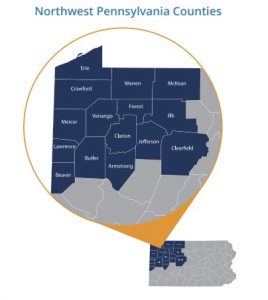Crisis Line Services
 The Northwest Pennsylvania (NW PA) Veteran Suicide Prevention Program operates on a three-pronged approach involving healthcare providers, community organizations, and Veterans and their families in the 15 counties of NW PA. The following presentation was shared by our program partners at UPMC Western Behavioral Health and discusses the information found in Crisis line services: A 12-month descriptive analysis of callers, call content, and referrals by C. L. Boness, A. C. Helle, and S. Logan, and recently published in Health & social care in the community, 29(3), 738-745. https://doi.org/10.1111/hsc.13325
The Northwest Pennsylvania (NW PA) Veteran Suicide Prevention Program operates on a three-pronged approach involving healthcare providers, community organizations, and Veterans and their families in the 15 counties of NW PA. The following presentation was shared by our program partners at UPMC Western Behavioral Health and discusses the information found in Crisis line services: A 12-month descriptive analysis of callers, call content, and referrals by C. L. Boness, A. C. Helle, and S. Logan, and recently published in Health & social care in the community, 29(3), 738-745. https://doi.org/10.1111/hsc.13325
Read time: 10 minutes
A PDF of the presentation is available to download.
Crisis line services: A 12-month descriptive analysis of callers, call content, and referrals
 The researchers evaluated five crisis lines, and a total of 5,001 calls over a period of one year. Features of calls (e.g. call length), callers, and information provided to the caller (e.g. referrals) were recorded.
The researchers evaluated five crisis lines, and a total of 5,001 calls over a period of one year. Features of calls (e.g. call length), callers, and information provided to the caller (e.g. referrals) were recorded.
The aims of the study were to understand the following about crisis line services:
- who is calling, including the caller’s victimization history;
- when calls are being made, which includes information on the call itself (e.g. duration, time of day, month);
- caller needs, such as referrals; and
- whether or not the callers found the service helpful.
Call Analysis: Callers and Content
 The median length of a contact with the crisis line was 15 minutes. However, this varied widely, including across mode of communication (such as text or videophone/TTY).
The median length of a contact with the crisis line was 15 minutes. However, this varied widely, including across mode of communication (such as text or videophone/TTY).
Victimization experiences included:
- Adult violence
- Child violence
- Drug and alcohol
- Bullying
- Intersectionality (e.g., LGBTQ and suicide)
Call Analysis: Referrals
 Of the calls received:
Of the calls received:
- 3% were referred to criminal justice agencies,
- 16% were referred to victim services, and
- 80% to other community services.
Outcomes
 99.5% of callers that were asked (61.35% of all calls; n = 3,068) reported the call as helpful.
99.5% of callers that were asked (61.35% of all calls; n = 3,068) reported the call as helpful.
Recommendations for crises line improvements include:
- Referral protocols for different pathways
- Training for diverse groups of callers
- Targeted outreach to diverse groups
- Staffing by time of day
- And how to best communicate via text for efficiency and planning
Looking to Get Involved?
 Whether you identify as a healthcare provider, community organization, or Veteran, there are several opportunities through the NW PA Veteran Suicide Prevention Program and PERU to connect to resources, participate in educational training, and promote harm reduction strategies. We are actively recruiting healthcare and community partners to work with us in meeting our goals and objectives. To learn more, visit the program website at theresilientveteran.org.
Whether you identify as a healthcare provider, community organization, or Veteran, there are several opportunities through the NW PA Veteran Suicide Prevention Program and PERU to connect to resources, participate in educational training, and promote harm reduction strategies. We are actively recruiting healthcare and community partners to work with us in meeting our goals and objectives. To learn more, visit the program website at theresilientveteran.org.
Need Help? Know Someone Who Does? Contact the National Suicide Prevention Lifeline at 988 or use the online Lifeline Crisis Chat. Both are free and confidential. You’ll be connected to a skilled, trained counselor in your area.

